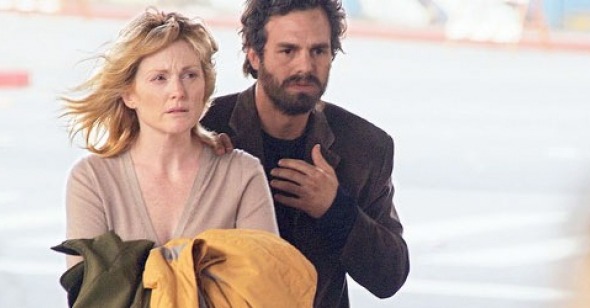Just Don’t Look
By Eric Hynes
Blindness
Dir. Fernando Meirelles, Canada, Miramax
Perhaps a decent film couldn’t have been made from Jose Saramago’s Blindness. Like any great work of art, Saramago’s novel resists transference. A gathering of words beaded into narrative, paced by rhythmic commas that both push forward and trip the eye, organized into paragraphs like economically shaped capsules of character and consciousness, and chapter breaks that arrive suddenly, stranding the reader in portentous white space, Blindness exists fully, necessarily, on the page. Yet, as its title suggests, the novel explores (and exemplifies) the challenges that face any artist in any medium; limitations—in this case a cast of characters incapable of seeing for themselves and for, as they are our proxy, us—push the artist to create and adapt to new terms. Save for a single crucial character’s perspective, Saramago refrains from visual description. When reading, the lack is appropriately conspicuous (and chilling) but also exhilarating: what remains seems sharper, and hits harder, than it otherwise might.
If one were to insist on adapting the text, why in the world would one ignore its central aesthetic challenge? Similar to stage-to-film transfers that “open up” action with camera movements that distract from a scene’s point of being (Proof, Hurlyburly, among others), Fernando Meirelles’s Blindness strains to visualize lack of vision. Shots without visual representation (all sound, no picture) are here brief and scarce. It’s as if the audience—after 80 post-silent years of cinema-going—were deemed too immature to be left alone with sound, even for a few seconds. Which of course is bunk, as is Blindness. Forget about Saramago-worthy, this inept film fails on its own degraded terms. Insistent on giving us something to look at, Meirelles can’t muster a single memorable or essential image.
Aesthetic challenges eschewed, we’re left with Saramago’s high-concept plot—the least distinguished aspect of the novel—which screenwriter Don McKellar follows faithfully, gracelessly. Proving yet again that there’s nothing—not even the work of a Portuguese Nobel Laureate—that Syd Field hackwork can’t improve upon, McKellar hustles the story forward bullet-point by bullet-point. A man (Yusuke Iseya, overplaying) stops his car at an intersection but doesn’t move once the light turns green. Cars honk, bystanders bark, but the man can’t proceed because he’s suddenly gone blind. Not total blackness blind, but an impenetrable milky white. A Good Samaritan (McKellar, whose offbeat asshole shtick—Exotica, Last Night—has reached its unwatchable apex) too readily volunteers to drive him home, then makes off with the car. The man’s wife returns home and rushes him to an eye specialist (Mark Ruffalo, bored) who’s stumped by the man’s condition. The next morning the doctor himself wakes up blind. Convinced that some kind of outbreak is afoot, the doctor alerts his superiors and is soon shuttled away to a quarantine site. Determined to accompany him, his wife (Julianne Moore, evoking fonder Children of Men memories) pretends that she too is blind. Meanwhile, those who came into contact with the infected two—the thief, patients, bystanders—also fall victim and are sent to join the doctor and his wife in a decrepit, moodily lit old hospital. Every day brings dozens more, their arrival heralded, Catskills pratfall cymbal-crash-style, by pathetic run-ins with metal furniture. Thus begins a prolonged second act of the blind leading the blind into abject anarchy.
Without the novelty of experienced sightlessness, the only character we can sidle up to is the doctor’s wife. Bearing the load better than the film deserves, Moore registers a depth of horror that is otherwise not reflected in Meirelles’s silly, desperately hyperactive storytelling. When all else fails, he languishes on a group rape scene, easily the longest sequence in this attention deficient film, thrusting the camera right up against dark shadowy faces and filthy clothes torn. True to the film’s exploitative heart,Moore gets bloody payback on behalf of the ladies, but this time the money shot’s in the dark.
Have I mentioned yet that Danny Glover shows up with an eye patch and transistor radio and provides everyone in quarantine with a zippy fireside chat summation of what’s goin’ on in the outside world? “The people were terrified, casualties multiplied” he sing-songs, oddly enthusiastic. It turns out the strange affliction continues to spread, and still no one knows how or why. Glover’s exposition makes the whole gang, many half naked (who needs clothes—we’re blind!), seriously bummed. So Glover turns on the old transistor and plays them a toe-tapper. Literally: all are shown tapping their grey-socked toes, a gauzy moment of collective grace amidst hell, Shawshank–style.
Meirelles, whose histrionic City of God and ponderous The Constant Gardener put him on the fast track to middling Oscar bait like Blindness, here spirals into embarrassing derivations and clumsiness. Finally sprung from Lord of the Flies meets Oz captivity, Moore leads our core, racially representative group (minus McKellar, who, early on, is thankfully shot in the face) through every charred-out abandoned city ever encountered in science fiction. Humans are animals, some are also naked, and all would kill for canned goods. Fires burn, waste drifts, then a dog arrives, slobbering “hope” all over Moore’s gratified face. Glover later opines, “For me nothing has been better than being blind.” Putting aside the indelicacy of that doozy, if it merely spared me the sight of Blindness, I’d believe it.
